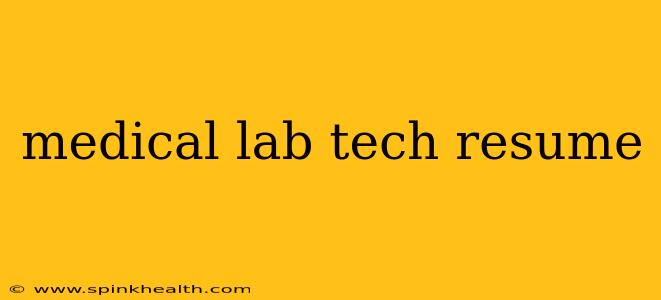Crafting the Perfect Medical Lab Tech Resume: A Story of Skill and Dedication
Landing that dream medical lab technician job requires more than just qualifications; it demands a compelling narrative showcased through a meticulously crafted resume. This isn't just a list of your accomplishments; it's a story of your dedication, expertise, and potential. Let's build that story together.
The Opening Scene: Your Contact Information and Summary
Your resume begins with a strong opening scene – your contact information. Clearly display your name, phone number, email address, and LinkedIn profile (if you have one). Avoid flashy fonts or graphics; professionalism is key.
Below this, craft a concise and impactful summary statement. This is your elevator pitch, highlighting your most relevant skills and experience in a few powerful sentences. For example:
Highly motivated and detail-oriented Medical Lab Technician with 5+ years of experience in clinical diagnostics. Proven ability to perform a wide range of laboratory tests accurately and efficiently, adhering to strict quality control standards. Seeking a challenging role in a dynamic healthcare environment where I can contribute my expertise and passion for precision.
Act I: Highlighting Your Skills
This section showcases your technical prowess. Organize your skills into categories for clarity. Think beyond just listing tests; focus on the skills involved:
- Analytical Skills: Mention specific laboratory techniques (e.g., ELISA, PCR, microscopy, flow cytometry, blood typing, urinalysis, hematology, microbiology, immunology). Quantify your achievements whenever possible. Instead of "Performed blood tests," try "Processed an average of 50 blood samples per day, maintaining a 99.8% accuracy rate."
- Technical Skills: List proficiency in laboratory information systems (LIS), electronic health records (EHR), quality control procedures, instrument operation (specify models if possible), and any specialized software.
- Soft Skills: Don't underestimate the importance of soft skills in a collaborative lab environment. Include attributes such as teamwork, communication, problem-solving, attention to detail, time management, and adherence to safety protocols.
Act II: Showcasing Your Experience
This is where your story unfolds. Use the reverse-chronological method, listing your most recent experience first. For each position:
- Start with a strong action verb: Instead of "Responsible for," try "Managed," "Developed," "Implemented," or "Optimized."
- Quantify your accomplishments: Use numbers to demonstrate the impact of your work.
- Use keywords: Integrate relevant keywords from job descriptions to improve search engine optimization (SEO) for applicant tracking systems (ATS).
- Focus on results: Highlight achievements that demonstrate your value to previous employers. Did you improve efficiency? Reduce errors? Develop new procedures?
Act III: Addressing Specific PAA Questions
Let's address some common questions potential employers might have, weaving them into your resume narrative:
## How to answer PAA questions within your resume narrative:
H2: What certifications do medical lab technicians need? Integrate this into your education or certifications section by clearly listing your certifications (e.g., ASCP, AMT) and relevant licenses. Mention any continuing education or professional development activities that demonstrate your commitment to staying up-to-date.
H2: What is the job outlook for medical lab technicians? This question is less relevant for a resume, but you could subtly highlight the growing demand for skilled medical lab techs in your summary statement or cover letter.
H2: What are the duties of a medical lab technician? Your experience section should implicitly answer this. Each role you describe should showcase your diverse responsibilities. Use action verbs to highlight your key duties and quantify your accomplishments whenever possible.
H2: How much do medical lab technicians make? Salary is best discussed during the interview process. Focus on your value and contributions rather than solely on compensation in your resume.
H2: What education is needed to become a medical lab technician? Clearly detail your educational background in your education section, including degrees, diplomas, and relevant coursework. Highlight any relevant academic achievements, such as dean's list or scholarships.
The Final Act: Education and Certifications
Clearly list your educational qualifications, including degrees, certifications, and relevant coursework. Again, use keywords and highlight any relevant achievements.
The Epilogue: References
Instead of including references on your resume, state "References available upon request." Prepare a separate list of references with their contact information.
By following this structure and incorporating the elements above, you’ll craft a medical lab tech resume that tells a compelling story of your skills, experience, and potential, significantly increasing your chances of landing your dream job. Remember, your resume is your first impression – make it count!

